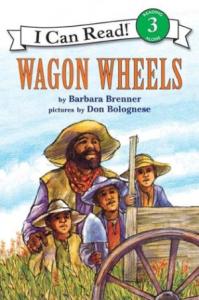Child endangerment in the 1870s.

Based on a true story. One wonders how much the story changed in the telling, as it apparently took place in 1878 and it's documented in the memoirs of somebody else who wasn't involved in the story.
It's a rather long book. You could read it to a child, but it would probably take a few days.
It's a story about a family of black pioneers, with a father and three kids, age 11, 8, and 3. Apparently their mother died on the way to Kansas from Kentucky. When they get to Kansas, it's almost winter and everybody lives in holes in the ground, with roofs made of grass and branches. It freezes and they run out of food, and then some Indians come and give them food. When spring comes, their father says, "You know what, I don't like it here. I'm gonna go somewhere else. You three stay here by yourselves. I'll write you and tell you where to go later." And then four or five months later, their father sends them a letter saying, "Okay, I'm 150 miles away. Kids, make your way 150 miles to me. By yourselves." And they do, taking a small wooden wagon that contains all of their possessions, and making the 3-year-old walk as much as possible so they don't have to carry him. At the end, they make it to their father and the book ends.
So it's a fictionalized account of a story that somebody told about somebody else. Again, I wonder how much of that is accurate. I'm not saying for sure it's inaccurate, but tales do change in the telling and retelling. It's definitely not something somebody would do today. It's just a cruel thing to abandon an 11, 8, and 3 year old to fend for themselves, especially in a very small town where everybody is living in holes in the ground in the middle of the wilderness, and then make them walk 150 miles alone through largely unsettled lands. Man, I guess being an 11-year-old was different 150 years ago. They had to hunt for their own food and everything.
As a historical story, it's useful, and it has a happy ending and everything since nobody dies or gets hurt, but it's just kind of callous how the father treats the children.